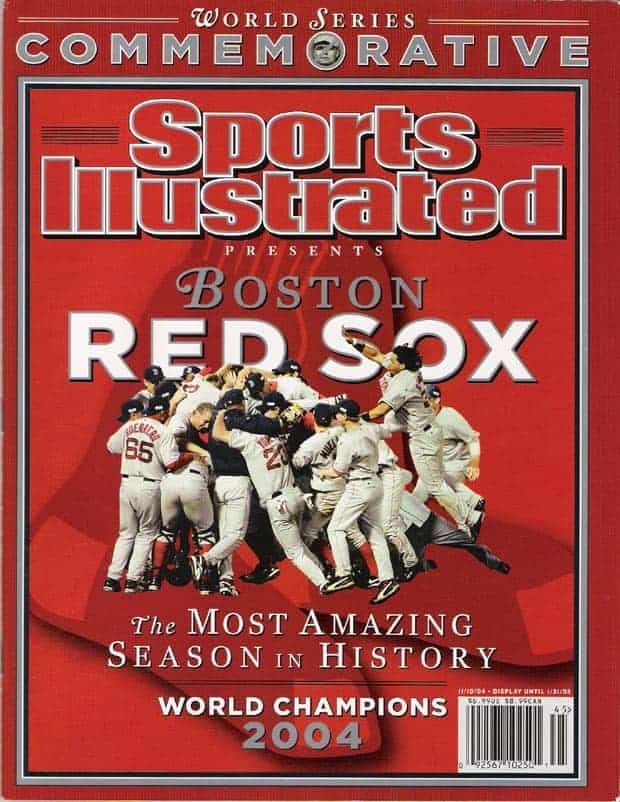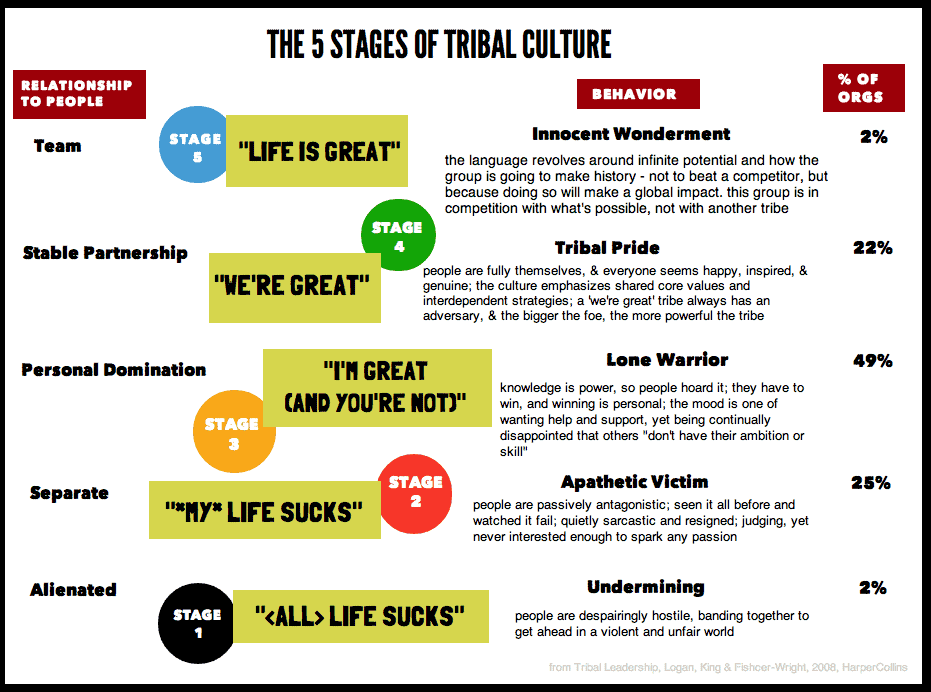You've just lost your 3rd straight game to your biggest rival by an embarrassing margin in front of your home crowd; they've won dozens of championship since your last win and they eliminated you from the playoffs in heartbreaking fashion last year.
Would you persevere like the 2004 Boston Red Sox?
Would you be able to rally the will to try to pull off something that had never been done before and come back to win 4 straight games to win the series?
Or would you pack it up and go home? No one would blame you, but you'd miss out on chance to make history.
 The 2004 Boston Red Sox believed.
The 2004 Boston Red Sox believed.
This week marks the 20 year anniversary of the greatest comeback in baseball history. The 2004 Boston Red Sox rallied from a seemingly impossible 0-3 series deficit to beat their arch-rival New York Yankees 4 games to 3 in a magical week in October 2014.
This incredible series is detailed in the ESPN 30 for 30 Documentary "Four Days in October" which gives an in depth look at how the 2004 Red Sox rallied.
Even if you're not a Red Sox fan (like I was going to school in Boston at the time), many of the little moments between the games provide great sports leadership lessons in how a team can rally together against all odds.
7 Sports Leadership Lessons from the 2004 Boston Red Sox
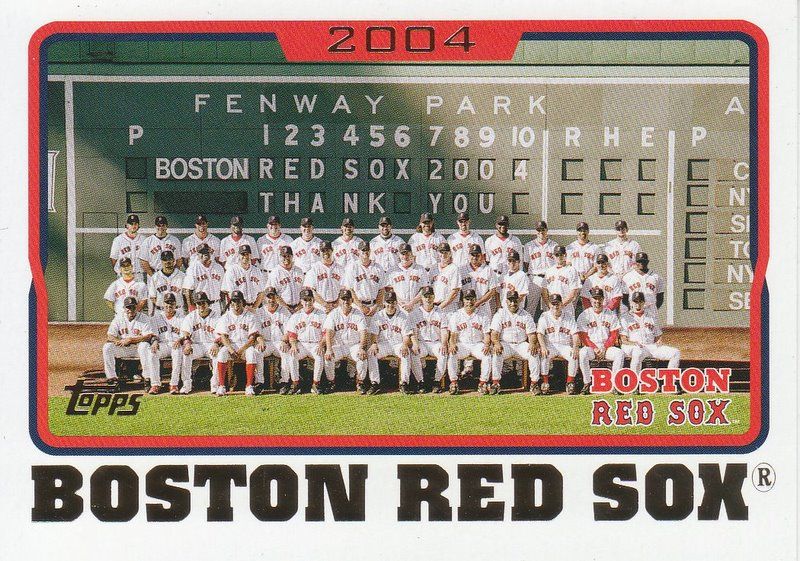
1) Start with the Right Team
The 2004 Boston Red Sox were a carefully constructed team. They had great hitters, a solid pitching staff, and role players for key responsibilities. With some key trades mid-season they created a roster that surged to make the playoffs and added players that would play a crucial part in the Red Sox making history.
Equally important, the team had a great culture.
As Red Sox Manager Terry Francona put it, "We have a lot characters that have a lot of character."
With the harsh Boston media and fans looking onward with disappointment when they fell behind 0-3, it was this culture of "characters," that were able to press on in the face of the ultimate, against-all-odds adversity.
Sports Leadership Lesson for You:
Having the right team matters greatly. In the classic book, Good to Great, Jim Collins shares the importance of team with the concept of getting the right people "On the Bus." As he puts it:
"Leaders of companies that go from good to great start not with "where” but with "who.” They start by getting the right people on the bus, the wrong people off the bus, and the right people in the right seats."
The 2004 Red Sox had the courage to trade a popular, but declining player, Nomar Garciaparra, to acquire the key pieces they needed to ultimately win. Do you have the right people with the right culture for your team to succeed?

2) With a Big Goal, Start Small
With their backs against the wall, the 2004 Red Sox did not look at the impossible task of winning 4 straight games against one of the best teams in baseball.
Instead, they focused on winning just 1 game. As manager Terry Francona said, "it wasn't, 'let's win 4,'...it was, 'let's win tonight.' "
Before Game 4, when the Sox comeback would begin, Four Days in October shows footage of first baseman Kevin Millar telling reporters, teammates, and anyone that would listen the simple mindset to focus on today's game:
"Don't let us win today...if we do, we got Pedro tomorrow and Schill Game 6, and in Game 7, anything can happen."
You could see as he told his teammates, they lit up just a little as his simple breakdown of the big goal inspired them.
Sports Leadership Lesson for You:
When you have a massive goal, break it down into smaller steps. As Chip and Dan Heath write in Switch: How to Change Things When Change is Hard, bringing change around a big goal requires making the first step easier:
"If you're leading a change effort, you better start looking for those first two stamps to put on you team's cards. Rather than focus solely on what's new and different about the change to come, make an effort to remind people what's already been conquered."
For the Red Sox, they knew they were one of the best teams in baseball as they had made it this far. They also knew they had great talent that could help them come back like Millar mentioned their aces Pedro Martinez and Curt Schilling pitching in Games 5 and 6 if they got there. How are you helping your team see the first step they can achieve for your big goals?
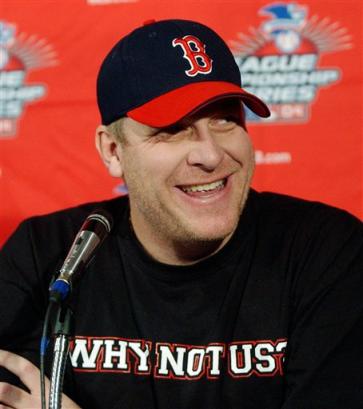
3) Use the Right Words
Most teams that are badly beaten will turn on each other. They'll blame one another for their mistakes, criticize those that didn't perform well, and can create an internal battle for those that felt did their jobs versus those that did not. All of these things destroy teams.
In the 2004 Red Sox's 19-8 loss at home in Game 3, they had failures all around. Every pitcher that entered the game gave up at least one run. Their hitters were only 2 for 13 with runners in scoring position. From the midpoint of the game on, it wasn't a close game at all.
Instead of getting down, the Sox players all embraced language showing they believed the team could still win.
Star slugger David Ortiz told reporters, "You never know. Things can change."
Talkative first baseman Kevin Millar called him and his teammates a "Group of idiots," that if anyone could do it, "We can."
Pitcher Curt Schilling wore a shirt to each press conference during the entire comeback that simply stated their internal motto, "Why not us?"
Rather than beating each other up, they stayed positive and focused on what they could control going forward.
Sports Leadership Lesson for You:
Watch the words you and your team use. It can reveal the mindset of everyone on your team.
In the book, Tribal Leadership, they focus on how you can use language to tell the way people are feeling and to change their mindset by changing their language. As they put, it the journey to the strongest team progresses as follows:
The 2004 Red Sox were using Stage 4 and 5 language. What language is your team using?
4) Plan for Success
When they needed to score late in Game 4, the team's manager, Terry Francona, went a step further with starting small, by telling his pinch runner, Dave Roberts to simply get ready, because, "Millar is going to get on and you're going to run."
This simple message helped get Roberts in the right mindset to succeed. He knew his job and could visualize his role in helping the Red Sox rally late.
This led to one of the most legendary plays in Red Sox history:
Dave Roberts Steals Second Base
Sports Leadership Lesson for You:
Plan for good opportunities to come. Legendary San Francisco 49ers Football Coach Bill Walsh wrote in his book, The Score Takes Care of Itself, about the importance of this planning when he said:
"Your ultimate assignment as a leader is getting those on your team totally ready for the battle. After that, you have to let winning take care of itself.”
If you put your team in positions to succeed and set their expectations on what they can do, you'll be surprised by what they accomplish.
Dave Roberts is a name every Red Sox fan will know for generations, because he was ready to steal a base when called to late in the game.
How are you preparing your team for success?

5) Lead by Example
Words alone are not enough to win. The greatest speech in the world only matters if there's both a plan to back it up and people ready to step up to do their part.
For the 2004 Red Sox, they took that mindset that they could come back and saw players step up all over. Slugger David Ortiz delivered clutch hits repeatedly. Dave Roberts stole second base. Keith Foulke anchored their bullpen with scoreless late innings. However, none was bigger that Curt Schilling.
Pitcher Curt Schilling ruptured the sheath around a tendon in his ankle. It required surgery, pain reliever injections to his ankle, and a special shoe just so he could pitch in Game 6. You could even see a patch of blood form on his sock as he pitched in the game.
Schilling pitched a great game, backing up his "Why not us?" shirt, and inspired his team as they forced a deciding Game 7.
How could his teammates not do their best with Schilling playing like that?
Sports Leadership Lesson for You:
Being an inspiring leader means setting a great example for your team. Your words will wring hollow if you do not. As Harvard Business School professor and best selling author Clayton Christensen writes in his book, How Will You Measure Your Life?, consistency matters:
"100 Percent of the time is easier than 98 percent of the time...Decide what you stand for. And then stand for it all the time."
Curt Schilling inspired his teammates with his example pitching Game 6 and his consistent words believing they could win.
Are you setting the right example to lead your team?
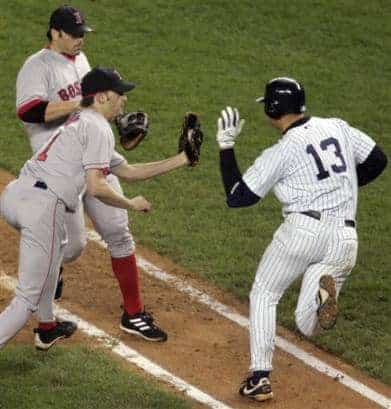
6) Keep Your Composure in Tough Times
The road to the 2004 Red Sox winning 4 straight against the Yankees was not smooth.
They won the first two games in extra innings.
Then, in a later game, star Yankee Alex Rodriguez slapped a ball out of the glove of the Red Sox pitcher that was tagging him out (which is illegal).
Yankees fans taunted Red Sox pitcher Pedro Martinez by yelling, "Who's your daddy?"
There were a million reasons for them to lose their composure.
Instead, the Red Sox persevered. When they built up a lead in Game 7, they never relented as they knew they had a mission to complete no matter the lead.
From their manager down to each player, they all stay focused on the task at hand each day, sticking to Francona's plan of, "let's win tonight."
Sports Leadership Lesson for You:
Do problems visibly rattle you? Be careful. Ben Horowitz, investor and former CEO, wrote in his book, The Hard Things About the Hard Things,
"As CEO, I had to worry about what everybody else thought. In particular, I could not show weakness in public...unrelenting confidence was necessary."
No matter what happened in each game, the 2004 Red Sox kept their composure.
Are you a steadying influence on your team?
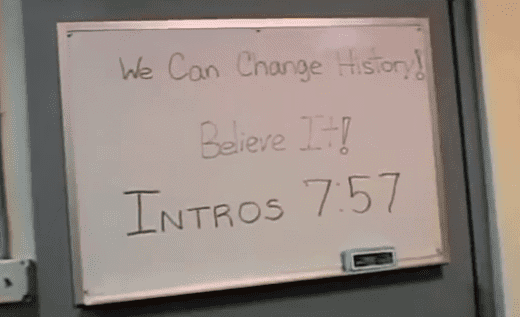
7) Be Part of Something Bigger than Yourself
For the players and coaches, there were few times they would have more of a chance to be a part of something special.
The team was back for the second straight year trying to advance to the pinnacle of their sport with their contending window closing. Their fans had been waiting 86 long years to win a championship, and no one had ever come back from an 0-3 deficit to win a baseball playoff series.
You could see the idea capture the team as they were interviewed between games.
They all talked about how excited they were by the chance to make history.
And when the Red Sox got on the bus to go to New York for Game 6, half way to their impossible comeback, Curt Schilling got on the PA system and said, "I keep coming up to a question I can't find an answer to...why not us?" which drew cheers from the team.
Sports Leadership Lesson for You:
Help your team understand how their efforts matter. As Dan Pink shares in his TED Talk, on the Puzzle of Motivation, the keys to motivating people are Autonomy, Mastery, and Purpose. In particular, Purpose is
"the yearning to do what we do in the service of something larger than ourselves."
Every Red Sox player knew how they could play a part in making history and winning a championship.
Does your team know how their efforts matter to your company's mission?
--
You can learn a lot from the 2004 Boston Red Sox.
One of the best things about sports are the life lessons you can learn from them. Especially if you study great teams and their coaches, you'll often find leadership lessons that you can apply at work and throughout your life.
The 2004 Boston Red Sox are a great example of a team you can learn a lot from as we showed with today's 7 sports leadership lessons.
If you want to learn more from great coaches and teams, check out some of other posts on sports leadership lessons, including:
- 5 Key Lessons from Bill Walsh in the Score Takes Care of Itself
- Learn leadership culture lessons the Chicago Cubs used to break their own curse
- Our favorite John Wooden quotes on Leadership

